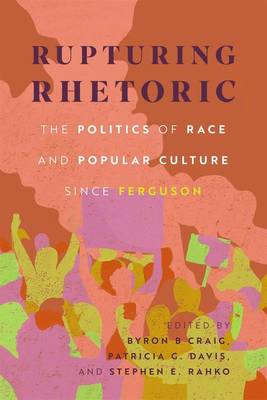
- Retrait gratuit dans votre magasin Club
- 7.000.000 titres dans notre catalogue
- Payer en toute sécurité
- Toujours un magasin près de chez vous
- Retrait gratuit dans votre magasin Club
- 7.000.0000 titres dans notre catalogue
- Payer en toute sécurité
- Toujours un magasin près de chez vous
Rupturing Rhetoric
The Politics of Race and Popular Culture Since Ferguson
110,45 €
+ 220 points
Description
Contributions by Maksim Bugrov, Byron B Craig, Patricia G. Davis, Peter Ehrenhaus, Whitney Gent, Christopher Gilbert, Oscar Giner, J. Scott Jordan, Euni Kim, Melanie Loehwing, Jaclyn S. Olson, A. Susan Owen, Stephen E. Rahko, Nick J. Sciullo, Arthur D. Soto-Vásquez, and Erika M. Thomas The events surrounding the 2014 killing of Michael Brown in Ferguson, Missouri, marked a watershed moment in US history. Though this instance of police brutality represented only the latest amid decades of similar unjust patterns, it came to symbolize state complicity in the deployment of violence to maintain racial order. Rupturing Rhetoric: The Politics of Race and Popular Culture since Ferguson responds to the racial rhetoric of American popular culture in the years since Brown's death. Through close readings of popular media produced during the late Obama and Trump eras, this volume details the influence of historical and contemporary representations of race on public discourse in America. Using Brown's death and the ensuing protests as a focal point, contributors argue that Ferguson marks the rupture of America's postracial fantasy. An ideology premised on colorblindness, the notion of the "postracial" suggests that the United States has largely achieved racial equality and that race is no longer a central organizing category in American society. Postracialism is partly responsible for ahistorical, romanticized narratives of slavery, Jim Crow segregation, and American exceptionalism. The legitimacy of this fantasy, the editors contend, was the first casualty of the tanks, tear gas, and rubber bullets wielded against protesters during the summer of 2014. From these protests emerged a new political narrative organized around #BlackLivesMatter, which directly challenged the fantasy of a postracial American society. Essays in Rupturing Rhetoric cover such texts as Fresh Off the Boat; Hamilton; Green Book; NPR's American Anthem; Lovecraft Country; Disney remakes of Dumbo, The Lion King, and Lady and the Tramp; BlacKkKlansman; Crazy Rich Asians; The Hateful Eight; and Fences. As a unified body of work, the collection interrogates the ways contemporary media in American popular culture respond to and subvert the postracial fantasy underlying the politics of our time.
Spécifications
Parties prenantes
- Editeur:
Contenu
- Nombre de pages :
- 277
- Langue:
- Anglais
- Collection :
Caractéristiques
- EAN:
- 9781496852335
- Date de parution :
- 20-06-24
- Format:
- Livre relié
- Format numérique:
- Genaaid
- Dimensions :
- 152 mm x 229 mm
- Poids :
- 589 g

Les avis
Nous publions uniquement les avis qui respectent les conditions requises. Consultez nos conditions pour les avis.





